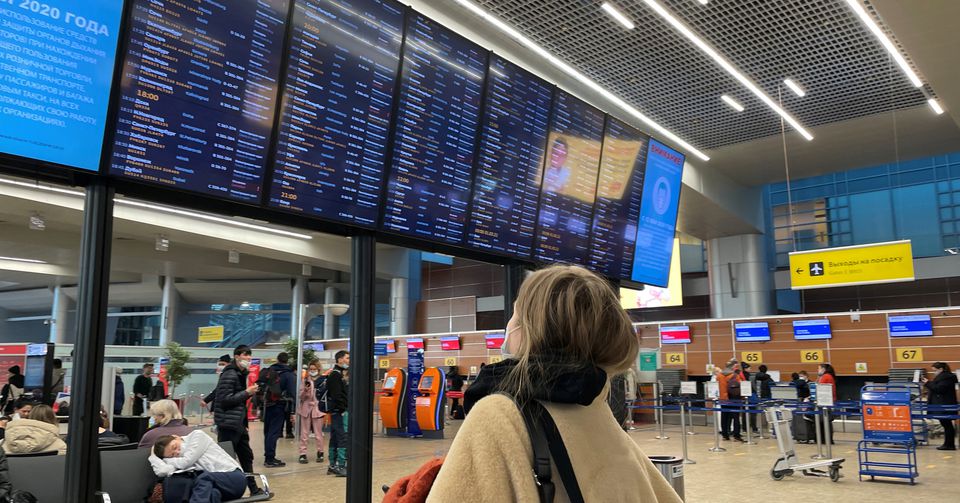Andrei, a 27-year-old Muscovite, had been looking for a ticket to almost any country for two days in a row. Something that under normal conditions would be very simple, now seems an impossible task.
Just two days after the “partial mobilization” was announced, at least tens of thousands of Russians, mostly men between the ages of 18 and 60, have left the country. But there are many more who are still trying, although in most cases with little success.
“From the first moment I heard the news, I knew I had to leave,” says Andréi. “I have been against this ‘special operation’ since its inception, and I am not willing to take the risk that they could enlist me in the army for a war that I do not share.”
But just minutes after Putin’s speech decreeing the mobilization, direct tickets to countries for which Russians do not need a visa, especially Turkey, Serbia and Armenia, began to run out. A little later it was not even possible to find tickets with stopovers for the next few days. 48 hours later, almost any search returns the result “no flights”, at least until the end of the month. Nor does any travel agency offer departures until the beginning of October, at least.
In the few cases that a flight appears, it either turns out to be non-existent, or they have exorbitant prices, up to 10,000 dollars, despite the fact that they sometimes have several stopovers.
Trains to other countries, and even to neighboring Russian cities, are also completely sold out, largely to people trying to cross the border.
By road the picture is not more encouraging. In most directions towards the border points, traffic jams are kilometers long, and can mean being stranded for many hours or perhaps days.
But at the same time, several channels emerged, especially Telegram, which currently brings together hundreds of thousands of people, where various information is shared about crossing Russian borders and the different ways to do so. Among them there are several of mutual support, especially to people who are in imminent danger of being recruited and do not want it.
In one of the first, “Pogranichni control” (Border Control) with more than 300,000 subscribers, many have recounted their experiences, offered advice and shared photos. In the first moments, everyone agreed that there were no problems, not even questions, at the borders; but later testimonies of interrogations appear at immigration controls, although in the end almost all of them managed to pass.
For its part, the Ministry of Defense clarified the conditions of the partial mobilization decree, explaining that those necessary for war work would be recruited, according to the agency. Sputnik.
“However, within the scope of partial mobilization, priority will be given to citizens with appropriate military specialties, necessary to fulfill combat tasks. Obviously, they are the riflemen, tankers, artillerymen, drivers and mechanics, among others,” said the spokesman for the General Staff of the Russian Armed Forces, Rear Admiral Vladimir Tsimlianski.
According to the decree, soldiers and non-commissioned officers under the age of 35, junior officers under the age of 50, and senior officers under the age of 55 are the ones subject to conscription. Students and high-tech specialists, among others, should not be called.
However, the testimonies on the street and on social networks assure that there are not a few cases of call-ups that do not meet these requirements, so the fear that anyone could be touched is latent.
In the first moments, all those who tried to cross the border succeeded, they have already begun to ask questions and the great concern of many is that they close that possibility. Rumors have already spread about it, which for the moment the airlines have denied.
Sources assure that at least Russian airlines have received orders not to sell tickets to Russian citizens of military age, and even return those already purchased under the pretext of overbooked.
According to opposition media and information appearing on social networks, there are leaks of a supposed clause in the decree that indicates that those recruited can reach one million. And also that the borders will be closed for Russian men of military age after the referendums in Donetsk, Lugansk and other Ukrainian regions to join the territory of Russia, which take place from September 23 to 27.
Meanwhile, the protests in several Russian cities, especially on the first day of the mobilization, have resulted in thousands of detainees for a few hours, many of whom coincidentally received their corresponding military summons the next day. Critical voices have continued in the virtual space and a new demonstration is called for this Saturday.
According to a recent survey (before the start of the mobilization) by the All-Russian Center for the Study of Public Opinion, 80.3% of Russians trusted Putin, and 76.7% approved of his management. It would be necessary to see how these figures are shown now, when the so-called “special military operation” has stopped developing in remote places and has knocked on the doors of supporters, opponents and the great mass of indifferent alike.
Many seem to respond with their actions. Andrey among them, who is now traveling after getting a ticket on a train to Omsk, a city near the border with Kazakhstan, more than 2,700 kilometers from Moscow.
Meanwhile, the stampede continues in all directions.






